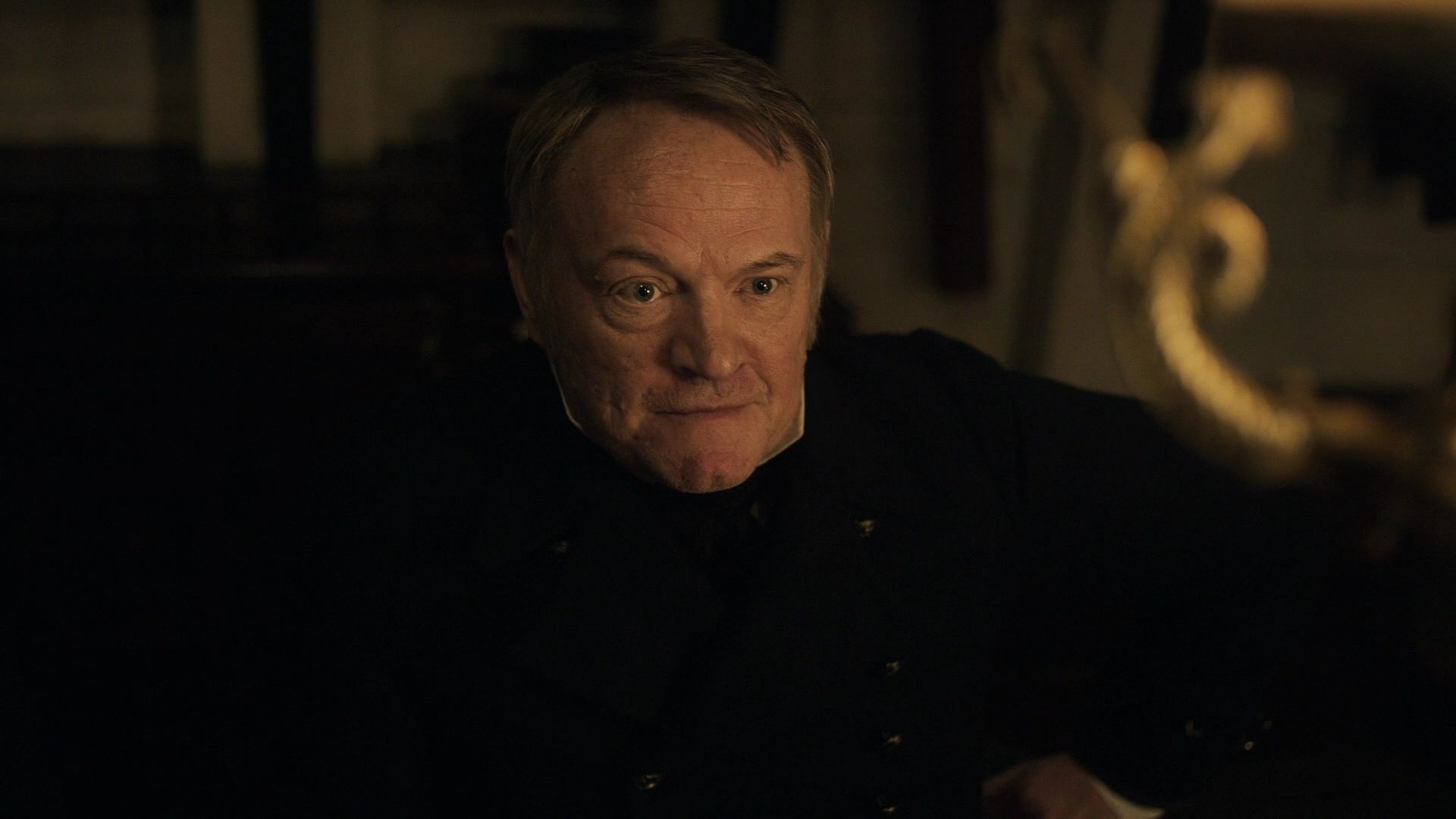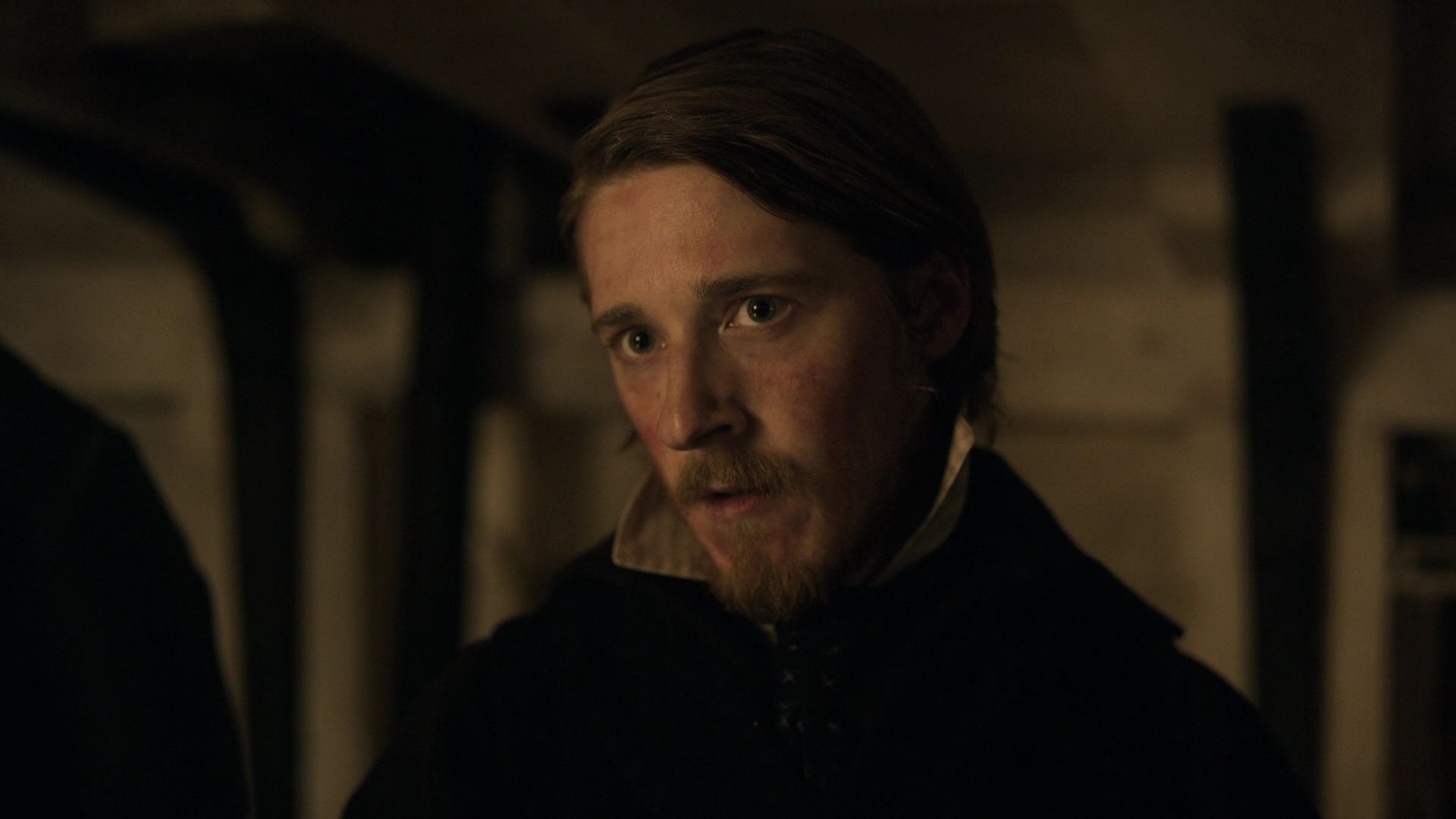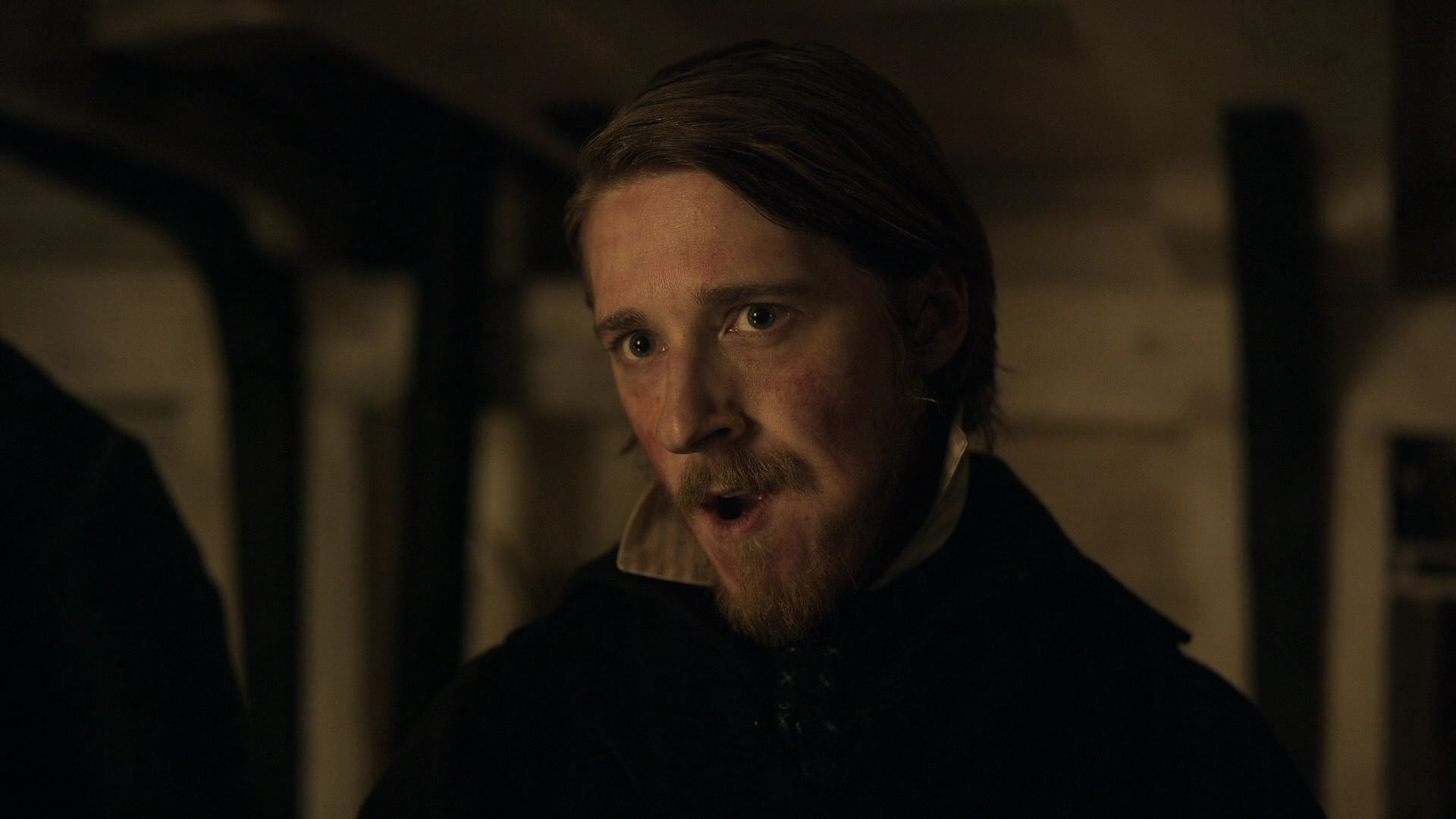On Hickey's Flogging, Or: Meta, As A Boy
skazka
Not Rated
Creator Chose Not To Use Archive Warnings
MetaEpisode s01e04: Punished as a BoyCanon-Typical ViolenceAdditional Warnings In Author's Note
2524 Words
Summary
Meta on the flogging scene from 1x04.
Notes
Originally posted on March 26, 2019 for The Terror Appreciation Week: Best Scene. I figured I’d crosspost since I’ve since changed URLs – I’m sure I’d write this really differently now, but I didn’t want it to be lost entirely.
Content warnings: discussion of canon corporal punishment, sexual violence, and homophobia; mentions of book-typical ableism and Hickey’s canonical crimes against Indigenous people.
*
Punish him, your honour, but not with that instrument of torture, the cat; it is cruel, degrading and unnatural. The man who has been once publicly whipped, if he possess one spark of manly feeling, sinks too low in his own estimation ever again to rise-, and, I trust, the day is not far distant, when so foul a stain to our national character, as the laceration of a fellow-creature’s flesh, will be blotted from old England’s naval and military code for ever!
- C.A. Somerset, The Sea
His flesh creeps it reddens as if blushing at the indignity ; the sufferer groans; lash follows lash, until the first mate, wearied with the cruel employment, gives place to a second. Now two dozen of these dreadful lashes have been inflicted: the lacerated back looks inhuman; it resembles roasted meat burnt nearly black before a scorching fire; yet still the lashes fall…
- Samuel Leech, Thirty Years from Home, Or A Voice from the Main Deck

Naming a favorite scene in this series is really freakin’ hard. I want to talk about this sequence in two parts, which could just as easily be considered as two distinct scenes – the questioning of the three kidnappers, and the flogging itself. I’m going to mainly focus on Hickey, Crozier, and the symbolic power shifts in this scene, but there’s a lot more to be said about just about every aspect of it.
The Questioning
- Captain, I want to say something, but daren’t speak the words.
- Oh, speak the words, Mr. Hickey.
Really, even if nothing following it was shown, I’d be crazy about this sequence for what it shows of Crozier. Silna has been through the absolute wringer both with the killing of her father and her ill-treatment at the hands of the men, and Crozier intervening to save her from the men could be played as unquestionably heroic – an enlightened act, a rescue – but for Silna Crozier isn’t her rescuer even as he re-asserts power over the unruly crew in the most bombastic way possible, he’s just another variable in the unfolding clusterfuck she’s now navigating. He can’t be trusted as her ally, or even trusted to continue giving a reliable damn about her predicament once the obvious challenge to discipline has been controlled. Crozier intervenes to save Silna from almost certain violence, but quickly his attention pivots from this civilian woman, her comfort and safety, to Hickey’s insubordination and the matter of the white bear, and that’s where the shit hits the fan. He takes an undeniably correct action – subduing the nearly-rioting crew and protecting this Netsilik woman who to his knowledge has already endured God-knows-what – and it almost immediately goes off the rails and gets exponentially more complicated and fucked up.
Hickey is undeniably the mastermind in this scene, and he can’t hide it; he’s the most forward of the kidnappers, he interjects aggressively and turns the questioning from an inquiry to an argument. He wants so badly to talk back to Crozier as if they were equals, to justify his actions and his rationale, to present his findings, and he just can’t shut his damned mouth. For all he uses the rhetorical device of not daring to speak of what he already suspects – that the beast is intelligent, supernatural, capable of communication and planning, capable of malice – he sure fucking wants to talk about it, and he seems to think Crozier will value those findings more than he dislikes being disobeyed, which is dead wrong. The scene pivots to being about Hickey’s insolence and Crozier’s ego, not about the gairl!!! the girl* or even the bear. Already Hickey’s sense of kinship with the Tuunbaq is forming. Here he constructs the Tuunbaq as Crozier’s enemy, and Silna as its witchy master. Before long Crozier will be his enemy, and he’ll be trying to crib from Silna with only the most superficial understanding of who she is as a “witch”. I’m never sure in this scene how much of Hickey’s account of Silna’s actions is an honest attempt to describe what he believes her to be, lightly embroidered, and how much is him bullshitting with what he thinks will please Crozier most, larding his description with the same anti-Indigenous racism that he’ll use to conceal his murders later.
Really I just need to gush about how Jared Harris plays Crozier as almost inflamed in this scene, slightly puffy and sweaty and off-kilter even in his attitude of irritable authority. He begins with a measured declaration of the consequences of Hickey’s actions as dictated by the Articles of War, hands knitted together and knuckles standing out as he deliberates. (I will also give a shout-out to Adam Nagaitis’ utterly perfect face journeys in this scene.) All the reactions in the room are gold – the way Manson’s lips just barely part with surprise when the sentence of twelve lashes is meted out on him, the way Hartnell’s face expresses his shock and protestation (which he, unlike Hickey, manages to restrain himself from verbalizing) and even the way Fitzjames is staying tastefully silent as Crozier hashes out the sentencing… it’s so much, it’s so good. But this isn’t where Crozier’s manners stop. Ever-forward, Hickey can’t resist pushing back at Crozier and needling him (“disrespect to who, sir?”) and at this moment when the other two are taking their punishment with all the shocked solemnity that could possibly be asked of them, that’s enough to set Crozier off on Hickey specifically. It’s when Hickey hits a new height of forwardness – claiming that he’s just saved Crozier’s life and implicitly that Crozier should be recognizing him for it, rewarding him – that Crozier totally snaps, striking the table and wigging the fuck out. Have you looked at Crozier’s face in that scene? He looks like he’s about to breathe fire.


…aaaaand Hickey’s tongue is in his cheek, immediately. He knows he fucked up. He just doesn’t know how badly he’s fucked up until later.

The Flogging
- Will it hurt?
- Yes, Manson. Very much. That’s the point.
(Jesus, poor fucking Manson. I don’t know to what extent we’re meant to understand him as intellectually disabled in the show, which would amplify the preexisting brutality of his flogging even further, but he’s so young and gentle that it’s horrible what happens to him in a way that feels different from what happens to Hartnell or Hickey.)
The floggings of the first two men receive almost a perfunctory treatment from the camera – for them this is a painful and humiliating event, but not necessarily a formative life event That’s not how it is for Hickey, and I’d say that arguably without the flogging (or without the flogging playing out as it does) he might not end up so far from normal rational behavior as he does. We can see that divorce from his earlier attitude playing out on his face as the flogging itself proceeds. Wherever Hickey is when that scene starts out, he’s in a vastly different place by the end of it, and his relationship to Crozier has dramatically altered beyond salvaging. If you’re willing to paint it in a more rosy light, the given intention of shipboard corporal punishment might be to chastise the subject and induce him to change his ways; in a way that’s how the flogging experience shakes out for Hartnell, at least far enough to let him know he doesn’t want to be flogged again and he won’t trust Hickey any further than he can throw him. But that’s the opposite of how it works for Hickey.
Hickey goes through a whole spectrum of emotions over the course of this scene – insolence, resolve, despair, spectacular vulnerability, arrogance, perverse humor. The flogging itself is a physically brutal act, and the staging amplifies the aspects of public corporal punishment which serve as a symbolic degradation rather than simply upping the number of lashes. Why is Hickey flogged as a boy? Flogging was already on its decline in the Royal Navy by the late 1840s. The corporal punishment of boys differed, perhaps nominally for clemency given their tender years – undignified punishments like birching and caning alongside the use of stress positions and public humiliation. But Hickey is a grown man, not a ship’s boy, and he is not birched or caned; instead of simply being flogged more times than his fellows (which by itself could be understood as proportionate to his larger share in the blame of their actions) the beating is doled out in a manner that’s exaggeratedly degrading, the punishment for an insubordinate man delivered as if to a disobedient child. Hickey is flogged to the point of drawing blood, and across the bare buttocks. Thirty lashes falls well short of the maximum number for the 1840s, nor is it clearly intended to cause disabling or lethal injury – it’s not forty-eight lashes, or a hundred lashes, or three hundred lashes – but for the initial number to be doubled and then tripled as punishment for Hickey’s mere mouthiness is pretty emphatic, and then the blows being delivered to Hickey as a boy is something else entirely. The sequence of punishments has escalated in ways that don’t involve the simple severity of physical injury.
In many ways the use of corporal punishment in the Navy mirrored its use on land – Hickey’s no sailor, we learn, so this particular punitive beating might summon up any number of associations with his prior life. The point is not only that being flogged hurts and harms, but more than that, that being flogged humiliates.
There is a sexual subtext in this scene, but I don’t find it in Hickey’s actions and postures as much as in Crozier’s punitive approach and the crew’s part in witnessing a sexualized humiliation – there is only one principal actor in the flogging itself, with Crozier giving the order, but others are pressed into service in auxiliary roles, stripping Hickey’s drawers and binding him in position spread-eagled and bent over. Just as we, the viewers, see Hickey exposed against his will, so do his fellow sailors. This scene evokes a rape. It functions as a repudiation of Hickey’s non-normative sexuality, about which Crozier clearly knows – the way Jared Harris bites off the word dirtiness is unmistakable† – but more than that the flogging is a rebuke of Hickey’s attempt to reach an intimacy with Crozier. Hickey is guilty of desiring not just passing pleasantries that might lead anywhere, or a motherland shared with his captain, but of coveting an equal footing with his captain, an intellectual parity, an equal share in power and decision-making. Crozier allowed Hickey a tiny glimpse at his own weaknesses, and now he has to punish him for that and to take out the frustrations he cannot otherwise express on a lower-ranking crew member who in many ways underscores his own deficiencies – young, sober, proactive, charming, even virile. [10,000 words of halfassed lit meta on contemporary stage depictions of naval punishment, White-Jacket, Billy Budd, and early 19th century narratives of the Bounty mutiny have been deleted here.] Never does ratty little Hickey look quite as inexplicably Christlike as he does in this scene. In such a shipboard flogging the sequence of events is regulated by a prescribed form and the anticipation of what comes next is a pungent part of the subject’s suffering.
This is punishment as theater – the drums, the audience, the implements and postures of punishment – and there’s nothing spontaneous about this scene except for Crozier’s unrestrained spite. The excess in this scene is not in the number of lashes delivered but in the way they’re delivered, in the emphasis on Hickey’s violated dignity and in the dark delight Crozier takes in seeing each blow. There is no need for Crozier to utter the word again, except to further reiterate how each blow is meant to underscore the last. What the fuck? The intention is to degrade Hickey, and in obliterating him to obliterate Crozier’s own deficiencies. It becomes more about symbolically purging Crozier’s own demons than about restoring discipline, and even if you accept that flogging is at times necessary to keep good order on a ship (which… I don’t) you can already see that Crozier is losing the plot here.
This impression of excess isn’t only for the viewers’ sake; there’s a whole spectrum of emotional responses among the spectators, but the dominant mood is that of disgust. Rather than serving as a triumphant defeat of Hickey’s wickedness, the scene oozes complex emotions; we see lots of rigid uneasy faces in the audience, and expressions that vary from Irving’s quiet satisfaction tinged with dismay to Gibson’s quiet regret and shame to Fitzjames’ wordless apprehension. Fitzjames and Tozer are both plainly aware of the risk of mutiny that Crozier’s visible instability heightens, and how this uncommonly degrading treatment singles Hickey out in more ways than Crozier perhaps intended. It’s not unambiguously clear who leaves Hickey the gift of tobacco he receives after the flogging, but it’s plainly one of these men who witnessed his bloody humiliation. Instead of uniting the men in contempt for wrongdoing, this public spectacle rallies at least some of them in support of an otherwise unpopular crewmate.
In this scene, Hickey is taken on a journey from untempered ambition and arrogance to something much darker, and Crozier is taken nearly to the brink of his personal darkness. He won’t fully realize how far his substance abuse issues and personal tumult have taken him until later. In these two scenes already, Crozier may have regained control of the crew, but he has ruptured his own discipline by letting his spite and resentment bubble outward into something beyond shipboard crime and punishment. The tenor of this scene is defined by Crozier’s personal difficulties and his personal relationship with Hickey, even if the basic act of flogging men for insubordination and disrespect could have just as easily happened under any captain. Can you imagine a flogging happening in this same way under Fitzjames or Franklin? Both of them might employ corporal punishment, though Fitzjames I imagine much more grudgingly and with a higher threshold for its use. But this scene isn’t just “jeez, wasn’t flogging in general violent and gross”, though it was – it’s something else entirely.
This scene is an opera of control and resistance, pride and humiliation – sketching a portrait of Crozier’s greatest weaknesses as a leader and setting out the great drama that in Hickey’s mind will play out between himself and his captain. From that point onward his desire for power and advantage will only grow, but his willingness to be satisfied within the normal chain of command has been shattered; any patience he had for a subordinate role is gone, and there’s no real way for his grievances to be settled except through bloodshed. Even when Crozier’s gotten past his demons as they show themselves in this scene – his struggles with alcohol, his insecurity and resentment – Hickey hasn’t, and that’s why it’s so damn hilarious/impactful later that mutineer captain!Hickey still sees the beef he had with Crozier as a major hangup, central to his identity, when that’s the last thing on Crozier’s mind at the end of everything. For Crozier, sinking as low as he does in this scene was only one of several humiliating failures as a captain. For Hickey, this scene crystallizes his lifelong bruised ego as a man of the lower classes and a despised Other, and foreshadows his future murderous usurpation of authority.
…tl;dr, I really like this scene. It’s good.
Footnotes:
*: Nive Nielsen was nearly 40 at the time of filming! Come on Crozier.
†: A lot of digital ink has been spilled about whether “dirtiness” in legal terms necessarily means “sexual transgression short of provable sodomy” here, and not slovenly habits, pissing and shitting where one shouldn’t, or just a terrible personality – as far as Crozier’s use of it goes, I think the point is moot.